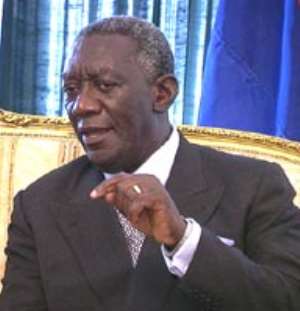
President J.A. Kufuor yesterday tasked the Minister of Finance and Economic Planning to ensure that the 2006 budget statement addresses the situation where the success story of the government remains untold.
At the opening of a three-day Cabinet retreat at Akosombo in the Eastern Region, the President observed that although his government had achieved a lot, not much of the story had been told.
He, therefore, asked the minister, Mr Kwadwo Baah-Wiredu, to ensure that the 2006 budget, which would be presented to Parliament in November this year, captured the achievements of the government as much as possible.
The retreat, which is also being attended by the Vice President, Alhaji Aliu Mahama, and key sector ministers who constitute the Cabinet, will discuss the general framework of the 2006 budget and the Ghana Poverty Reduction Strategy (GPRS).
The meeting will also discuss matters within the government and issues relating to the New Patriotic Party (NPP).
President Kufuor said the 2006 budget should reflect the remarkable achievements that the government had chalked so far.
“Although we have achieved a lot so far, we have not shown our good side well,” he stated.
The 2006 budget is expected to consolidate the gains so far made in macro-economy stability and also address some of the problems confronting the country.
Already, the state of the economy for the first quarter of 2005 was good as it showed continued progress towards increased real GDP growth, with low and stable inflation and relative foreign exchange rate stability within a prudent fiscal and monetary framework.
However, the upsurge in crude oil prices on the international market continues to pose a potential threat to the economy.
An official document posted on the Ghana government website(www.ghana.gov.gh) by the Ministry of Information said by the end of March this year, the inflation rate was 16.7 per cent and the annual average inflation rate in March was 12.5 per cent.
The cedi appreciated in real terms by 8.7 per cent against three major currencies using the real Weight Index.
According to the document, total revenue and grants for the first quarter amounted to ¢5,200.3 billion while total payments for the quarter came to ¢4,914 billion.
The recorded budget deficit of ¢378.7 billion was equivalent to 0.4 per cent of current GDP.
Additionally, the growth of monetary aggregates continued to slow down, with interest rates remaining stable.
Gross international reserves stood at $1,625.0 million at the end of February, 2005, equivalent to 3.7 months of imports.
In his last State of the Nation address delivered before the dissolution of the Third Parliament of the 4th Republic on January 4, 2005, President Kufuor gave a run down of some of the achievements of his government.
For example, the government's ability to reach the HIPC completion point gave the country an immediate debt relief of $2 billion and a further $2 billion to be cancelled over the next 20 years at the rate of $100 million a year.
This year, Ghana has been selected by the G-8 alongside 17 other poor countries, to benefit from total debt cancellation.
The debt cancellation, which is likely to come into effect in December 2005, will give relief amounting to more than $4 billion.
Additionally, Ghana was among the first group of countries adjudged to have qualified to access the first tranche of the Millennium Challenge Account (MCA) of $1 billion, set up by President George Bush to help developing countries.
President Kufuor told Parliament that the most gratifying endorsement of his government's policies and programmes was remittance from Ghanaians resident abroad, amounting to $2 billion in 2004.
He cited the recent debt forgiveness by the G-8, the support from the MCA, the revival of VALCO and Ghana's qualification for the World Cup final as very positive developments and said it was great to be a Ghanaian.
There has also been a phenomenal improvement in the road, health, communication, transportation, energy, agricultural and educational sectors.
In cocoa production, for example the country registered the highest ever annual production of 700,000 tonnes, which yielded more than $1.1 billion in 2004.
These major achievements as well as the need to consolidate the gains, will inform discussions on the 2006 budget at the Cabinet retreat at Akosombo.




 2024 elections: Resign if you can't be faithful to party - Sagnarigu NDC PC desc...
2024 elections: Resign if you can't be faithful to party - Sagnarigu NDC PC desc...
 Five arrested, remanded over alleged murder of two police officers at Transacco
Five arrested, remanded over alleged murder of two police officers at Transacco
 Tax exemptions better than incentives for churches – Tax Analyst tell Bawumia
Tax exemptions better than incentives for churches – Tax Analyst tell Bawumia
 Transport Minister sues Law Platform Editor for defamation
Transport Minister sues Law Platform Editor for defamation
 Voter registration: Police arrest NPP Treasurer for Mpohor for registering minor
Voter registration: Police arrest NPP Treasurer for Mpohor for registering minor
 "This nonsense must stop" — Lawrence Tetteh vows to march to Jubilee House over ...
"This nonsense must stop" — Lawrence Tetteh vows to march to Jubilee House over ...
 2024 elections: “If indeed you stand for peaceful elections the time is now for ...
2024 elections: “If indeed you stand for peaceful elections the time is now for ...
 I have the attributes to be president of this country — Bernard Monarh
I have the attributes to be president of this country — Bernard Monarh
 Cecilia Dapaah saga: ‘Turf war’ between AG, EOCO, OSP indicates they’re not ‘cor...
Cecilia Dapaah saga: ‘Turf war’ between AG, EOCO, OSP indicates they’re not ‘cor...
 Ghana will become the first African country to embrace blockchain-powered gover...
Ghana will become the first African country to embrace blockchain-powered gover...
